This Week’s Stories in Russia Update:
– Sweden Confirms Submarine in October Was Foreign Vessel
– Kadyrov Announces Assassination of Georgian Terrorist Omar al-Shishani
– Independent Editor Detained at Airport in Khabarovsk
–OSCE Sees 100s Of Fighters Cross Russian Border Into Ukraine, And Trucks With Bodies Leaving
– FIFA Clears Russia and Qatar of Corruption Charges, But US Prosecutor Seeks Appeal
– Russia Sends Warships Toward Australia Ahead Of G20
– Moscow Oil Refinery Blamed for Gas Leak May Be Closed for 3 Months
– Sochi Olympics Builder Detained on Suspicion of Exploitation of Workers
– Russian Legislators Receive Responses from Military Officials on Soldiers Reportedly Killed in Combat in Ukraine
– Editor-in-Chief of Kommersant Steps Down Amid Rumors of Government Pressure
– Still No Clear Explanation on What Caused Gas Leak in Moscow
– Free Ad Advice for CNN — Love, The Interpreter
– CNN Says New Media Laws Drove It From Russia–
– Bezler Reported Alive, and to Get ‘Hero of DPR’ Award, But is Strelkov Slighted?
– LifeNews Claims Anti-Corruption Blogger Navalny ‘Funded by the Kremlin’; Putin Administration Denies
– CNN To Cease Broadcasting in Russia in December
– Moscow Oil Refinement Plant Denies Malfunction Occurred, Despite Air Pollution Monitor Statements
– Toxic Gas Leak from ‘Malfunction’ at Oil Refinery: Emergencies Ministry
– Russia Launches Yet Another Propaganda Outlet, Sputnik News
Please help The Interpreter to continue providing this valuable information service by making a donation towards our costsâ€.
We have made study of the Kremlin’s propaganda methods a specialty at The Interpreter. Last week we released a joint report with the Institute of Modern Russia titled The Menace of Unreality: How the Kremlin Weaponizes Information, Culture and Money, a special report by Peter Pomerantsev, author of Nothing is True and Everything is Possible: the Surreal Heart of the New Russia, and Michael Weiss, our editor-in-chief, on the Kremlin’s weaponization of information, culture and money to achieve foreign policy goals and undermine opponents.
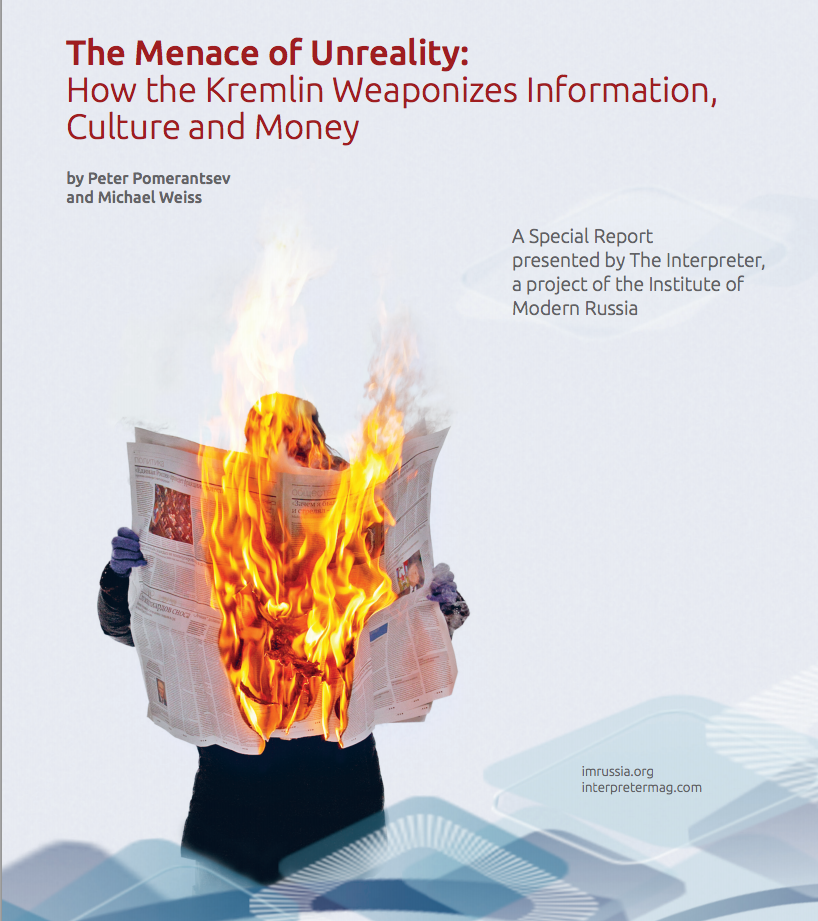
Last month we published “Life of Bryan: How an RT Columnist Tries to Influence the Debate on Russia and Ukraine.”
Periodically, we’ve also published investigations of how Russia state media manipulates the news. See, for example:
– What We Can Learn from Russian State TV and Russian-Backed Separatist Propaganda Videos)
– Andrei Stenin and His Fellow Travelers: How Russian State Media Help Fight the War Against Ukraine.
We’ve also worked to expose Russian disinformation campaigns, such as false claims that the Ukrainian military is using phosphorus; involved in organ-trafficking; or that American mercenaries are fighting in southeastern Ukraine. We’ve worked extensively on compiling evidence for the shooting down of MH17 by Russian-backed separatists which along the way debunks some of the Kremlin disinformation.
Troll Farms
Russian journalists Anya Polyanskaya, Andrei Krivov and Ivan Lomko first began to discover organized disinformation operations, known as “web brigades” or “troll farms” for their attacks on critics of the Kremlin on Internet forums, in 2003. Their first article that year was
“Virtual Eye of Big Brother” at Vestnik with Andrei Krivov and Ivan Lomko a later version of which was translated here and here. Then there was a series on La Russophobe’s blog in 2007 titled “Commissars of the Internet,” and the seminal piece The Kremlin’s Virtual Squad in 2009.
The independent Russian press has continued to investigate the “troll farms” that bedevil comments sections on news media and social networks and in 2013, Novaya Gazeta traced their own persecutors to an office building with a staff organized to invade social media. The story also caught the attention of Western journalists.
Last week, we covered Delovoy Peterburg’s further investigation into the company Internet Research and their move to new offices and increase in staff (which also involved some staff reportedly leaving when work conditions grew worse). The payroll was at least $250,000 a month, which mean the paid trolls were getting about $917 each month. At that time, we only had the information that the office was on Savushkina Street in St. Petersburg.
Since then, the Kremlin Troll Farm has been precisely located (here).
Translation: Savushkina 55. New building for the bots. Pass system. No sign at all. I won’t say whose photo this is.
(Note: The Interpreter is a project of Institute for Modern Russia, headed by Pavel Khodorkovsky, the son of Mikhail Khodorkovsky.)
Another Twitter user said he knew the building and that it did not
have a classified pass system as such but a regular access control
system (ACS).
The four-story building , including
an underground parking lot, was for rent in August 2012
when Google
Street View captured the image, as we can see a “for rent” sign in the
window. It is 4,500 square meters in size in total. A blue construction
fence is visible in the photo with an architectural plan.
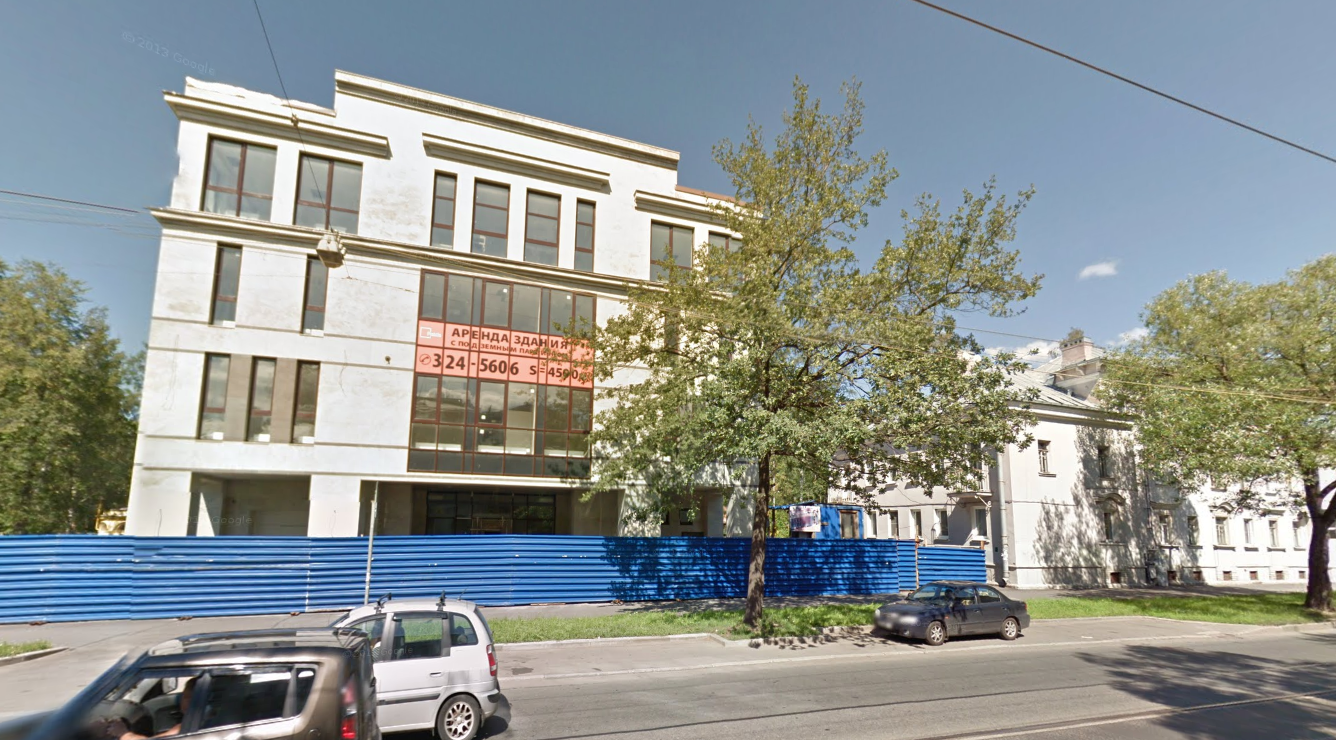
Yet another participant in the Twitter discussion suggested looking up the phone number.
Google search leads to an online report that shows the telephone number belongs to a real estate company with a web site at praxis.ru. That in turn leads to a company named SETL which handles real estate in the northeast of Russia. The CEO is Ilya Yeramenko, and the company has done well in real estate in a growing market, Vedomosti reports.
Yandex Panorama has a photo that shows the building
later, already being renovated with a construction fence and an architectural plan visible in the photo. It’s not clear when this photo was dated, but a Yandex
photo dated March 2014 shows the same blue construction fence.
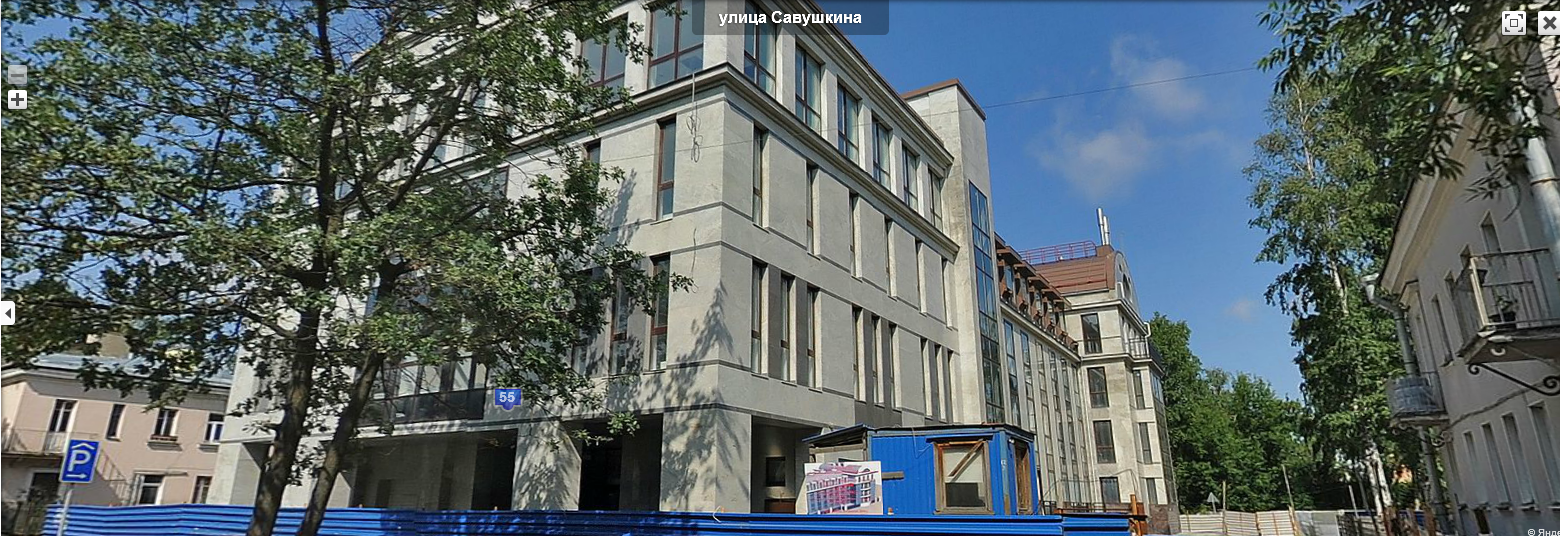
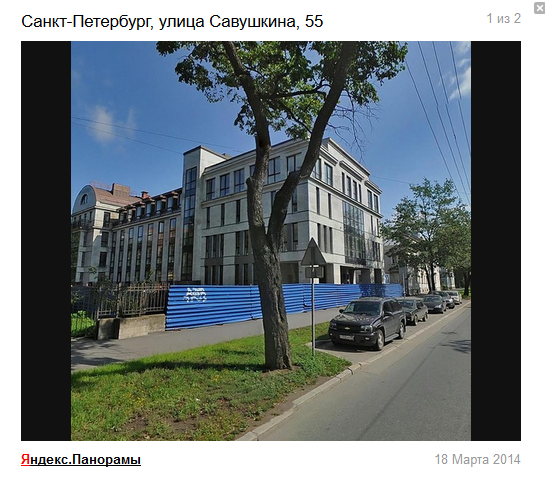
According to Lenizdat, an online
publication in St. Petersburg that has critically covered the Troll Farm
and a related Russian and Ukrainian news operation which shared the
building, 2,500 meters of the space was shown in classified ads as
renting for 3 million rubles ($64,400) per (the ad is no longer visible
even in Google cache.)
The independent Russian press
focused on these details because these were signs that some individuals
with a lot of cash were able to rent this building, renovate it, and
lease it to several similar businesses.
DP’s source reported that salaries
at Internet Research were high by Russian standards, prompting some
skepticism from some readers. But as a forum participated nicknamed
O6oroten noted in a debate about the trolls’ salaries, current want ads
which can be found in Yandex classifieds, placed by Internet Research,
the company that manages the trolls, indicate a range of salaries:
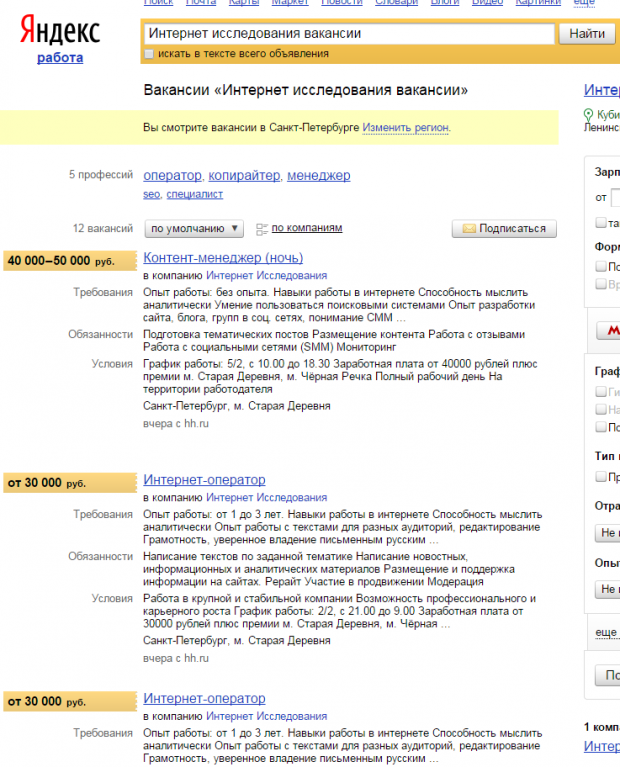
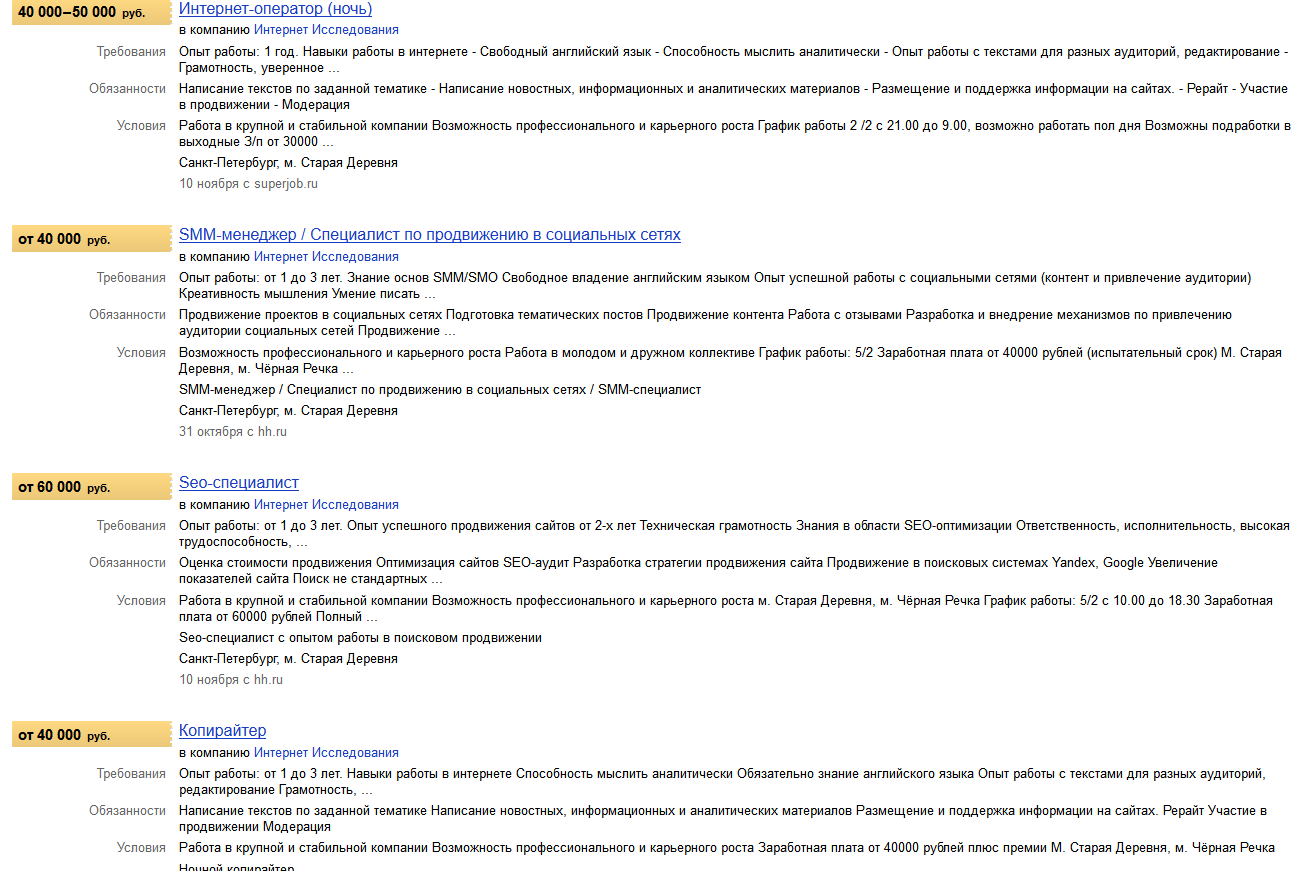
The paid troll operation needed
copywriters, creative content producers, web site operators, social
media managers, SEO experts — for multiple shifts, day and night.
For example a “creative manager” was
sought with experience from 1-3 years in Adobe, Photoshop and
Illustrator with a “developed sense of style, visual thought and
creative thinking.” His or her job duties would include making
personas, or concocted online identities, to interact with others,
drawing cartoons, and making illustrations and demotivators – the last a
reference to a sarcastic style of poster with a humorous line.
The job
offer was for a “large and stable company” with the possibility of
“career advancement. You could also arrive casually at 11:00 and work
until 7 pm. The salary “from 40,000 rubles” which is $874 dollars, not
as high as reported by DP’s source, but other jobs at the firm paid
more.
On the night shift some of the positions offered 40,000 rubles “plus bonuses.”
Among the positions is a job for a
“social media manager” with 1-3 years of experience and “fluency in
English” whose duties include “promotion of content, work with replies,
development and implementation of mechanisms for attracting an audience
of social networks.”
The SEO (search engine optimization) specialist is most valued, and could earn 60,000 rubles, or $1,264, per month.
Lenizdat’s journalist Sofiya Korzova has also researched the
fellow tenants of Internet Research in the building, an online news
service called Federal News Agency (FAN) which, despite its name, is
privately owned by undisclosed business people. Lenizdat suspected that
Yevgeny Prigozhin, who founded Internet Research, Ltd. was related to FAN.
The presence in the same building as
Internet Research of another operation involving trying to influence
perceptions about events in Ukraine seemed just too much of a
coincidence.
But the director of FAN, Yevgeny
Zubarev, does not confirm there is any relationship between his company
and Prigozhin, saying his project is financed by private Russian
investors whose names he does not disclose.
Zubarev is a prominent St. Petersburg journalist and writer, author of the book Miletseyskaya Akademiya (Police Academy), “2012: Khroniki Smutnogo Vremeni” 2012: Chronicle of a Time of Troubles and others. He worked for Chas Pik, the St. Petersburg daily and then moved to Rosbalt, the news agency specializing in politics and human rights.
FAN’s editor-in-chief Vladislav
Krayev previous worked at the northwest regional center for RIA Novosti,
and was promoted to deputy news director before he left. RIA Novosti
was reorganized earlier this year as state media consolidated and came
under greater control of the Kremlin, and many journalists lost their
jobs.
Lenizdat has pointed out that the
financiers must be generous, paying high rents and salaries; FAN is
renting several offices on the first floor of 55 Savushkina. The web
site does not yet show a license from Roskomnadzor, which controls the
press and registration under Russian law. Zubarev says Roskomnadzor
issued permission, but the form with their number has not reached them
yet.
FAN has divided its news sections
into “green” which contains information it has checked personally or
found reliable, and red is for news that needs more checking. They claim
to be independent and neutral.
“It is worth noting that if the news
feed is more or less neutral, the tone of the materials in one of the
most-often refreshed sections — Ukraine — could rather be
characterized as ‘pro-Russian,'” says Lenizdat. For example, an article
on the recent Ukrainian parliamentary elections claims there was fraud,
although less biased monitors did not find it to be a significant issue.
Zubarev explains away the appearance
of bias by citing the fact that his reporters are refugees from Ukraine
who were “rescued from political persecution; they were subjected to
serious pressure in their homeland on the part of nationalists and
official representatives.” Again, no credible international body has
found such discrimination to be a pattern of abuse in Ukraine. Zubarev
covered the Crimean annexation, commenting at the time that residents
supported it as a way of expressing their unhappiness about the new
government in Kiev.
Following up on its original
coverage of the “Troll Farm” in the article by Anton Butsenko in Delovoy Peterburg (DP) which we excerpted, Butsenko
also discovered a network of fake “Ukrainian” sites created to mislead
public opinion — and has traced them to FAN.
DP claims that the publication is
obfuscating or even dissembling when it says it is “Ukrainian” and
advertises” offices in Kiev, Odessa, Lviv and Kharkov.” Sources inside
several of the “offices” said they are actually in Russia; “we’re on the
same street as you,” said one person in a telephone call. Zubarev, the
director of FAN is Russian. There do seem to be some local
correspondents, but they are only a handful.
DP pointed out that the Internet address of one such “Ukrainian site” was registered by Nevskiye Novosti [Neva News] which is named for the Neva River in St. Petersburg. We
confirmed this, and also note that the servers are hosted in Kansas in
the United States.
The same contact email for these
domains is provided to rent rooms by the hour at the Hotel Bristol on a
quiet side street in Moscow located here on Google Maps.
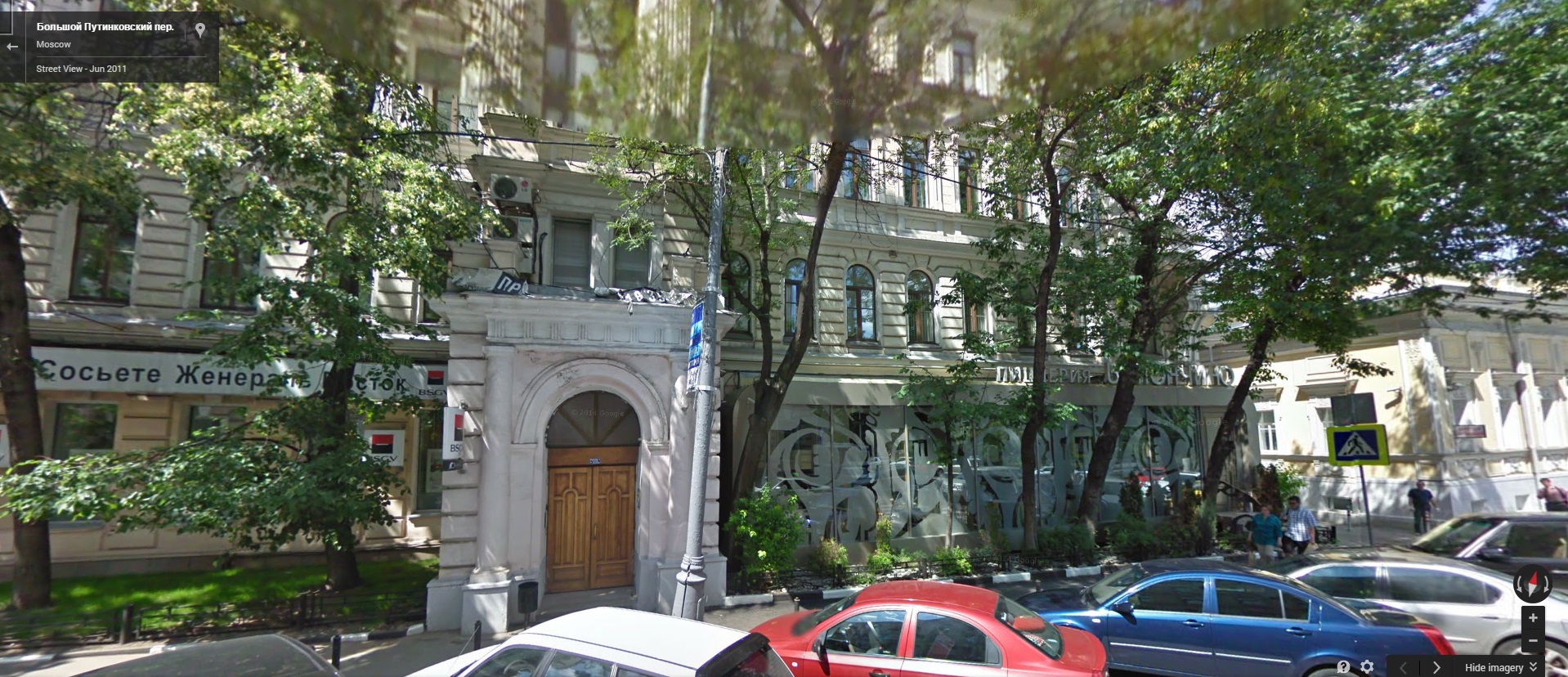
Under previous
management when it was called the Hotel Mega, rooms went for 2,500
rubles per bed a day ($54) but now it will cost from $12 to $42 per
hour, with a 50% discount for more than 12 hours.
Zubarev countered queries about the
Ukrainian domains he owned by noting DP itself is owned by Bonnier Business Press, a Swedish
business media conglomerate. DP pointed out that Bonnier at least had
offices in St. Petersburg, whereas DP could not get the Kharkiv office
of FAN to answer the phone.
DP noted that the domain was
purchased August 25, 2013 and the first news appeared on September 2,
with a pro-Russian and anti-American bent. According to Liveinternet,
the cite had more than 200,000 visitors. Lenizdat tried to reach people
in the office listed at 17 Partsyezda, 38A, but there was a robot voice
answering the phone, and other tenants of the building said they didn’t
have any media operations as neighbors.
DP couldn’t get anyone at FAN, Nevskiye Novosti
or another related operation, FAP (Federal Incidents Agency) to take
calls. FAN shows 522,000 unique visitors and FAP 169,400, and according
to sources has about 100 employees. Sources also told DP that the whole
Ukrainian venture was cooked up merely to build traffic. Because Nevskiye Novosti
criticizes the opposition and not the authorities in Smolny, the St.
Petersburg administration, it was seen as a “project” invented by the
authorities, possibly funded in relation to the elections.
DP also investigated another
operation promoting “Novorossiya,” novorus.info and other similar
copy-cat sites like newsdon.info, newslava.info and rus.kg, run out of an
office in Moscow. “Novorossiya” is the notional realm made up of parts
of Ukraine, Moldova and Belarus and currently involves the
self-proclaimed “People’s Republics of Donetsk and Lugansk” in southeastern Ukraine. Lenizdat
couldn’t find a formal connection between these sites and Zubarev’s FAN
or Internet Research, and it seems to have more rabid propagandistic
style. Interestingly, the contact office given for newslava.info is the
government building in Sevastopol, but officials there professed no
knowledge about this.
The owner of these web sites, Andrei
Surkov, also happens to be in the hotel business in Moscow, and he also
buys modern art. These successful businesses ensure his press is
independent, he told Lenizdat. He also says 30% of his costs are
supported by readers’ donations. The Yandex wallet used to collect
online donations is linked to a religious educational television program called
Radost’ Moya [My Joy], a Russian Orthodox family program which is registered to a company called Miroizdaniye [Creation].
 Screen grab from radostmoya.ru
Screen grab from radostmoya.ru
According to Liveinternet,
novorus.info had 563,500 visitors in one month, only 30% of which were
in Ukraine. The others had less, 50-100,000. These sites gain even more
reach as pro-Ukrainian sites argue about them on forums. Newsdon.info is
nick-named the “Lugansk Battery of FSB Internet Troops.”
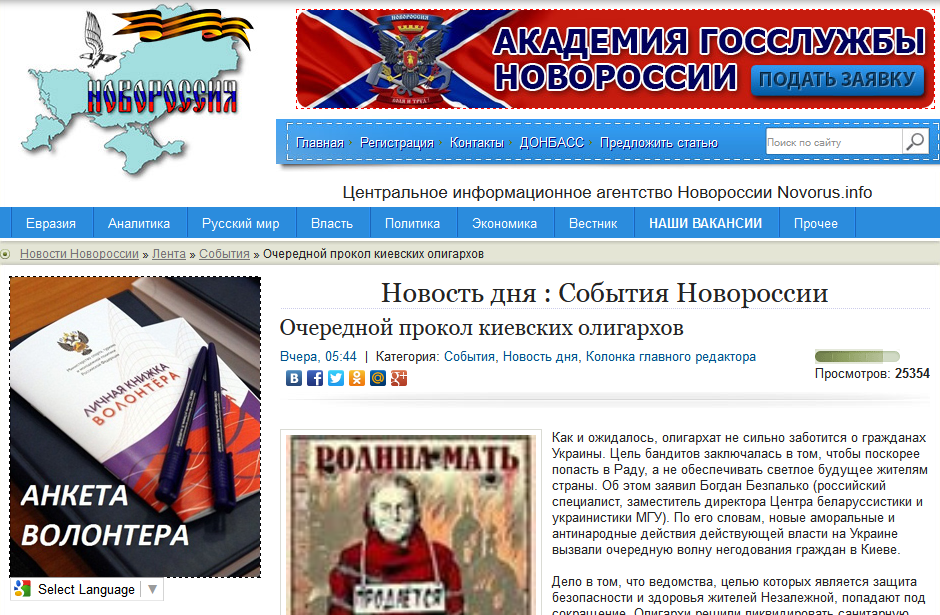
Newsdon.info was said to be run from
St. Petersburg, and all the domains were supposedly opened under the management of
Vyacheslav Surkov, the Kremlin’s “grey cardinal” in early March 2014, said DP.
There was no evidence supplied for this claim; Surkov, or Vyacheslav
Volodin, the first deputy chief of the presidential administration, are
often suspected of being behind orchestrated disinformation plots or
efforts to manipulate civil society groups in state interests. Perhaps
they do instigate such activities, given that someone in the government
is likely organizing and financing these operations, but it is difficult
to prove.
Prigozhin has been covered briefly
in some articles in the Western press, but Moscow’s Novaya Gazeta and St. Petersburg journalists in Delovoy Peterburg and Lenizdat
have done the most work on trying to fathom how this figure has gained
such highly-placed connections and also gotten into the disinformation business.
Alexandra Garmazhopova, a journalist based in St. Petersburg, published
an article in July of this year in Open Democracy, Yevgeny Prigozhin:
Caterer to the Kremlin.
She describes a number of projects
run by Prigozhin and his people, from his failed restaurant empire to
making a film about Russian emigres in America who were unhappy they had
left their homeland.
Lenizdat has also done a deeper dive on Prigozhin’s background and web of businesses, as has Russian-language Forbes.
These are all worth studying to understand the complex influence operation
established by Prigozhin which has reached as high as Putin and top
military officials, as well as US President George Bush and other foreign
leaders.
Yevgeny Prigozhin is infamous for
writing a number of pieces attempting to discredit the work of
independent news operations ranging from Novaya Gazeta and Fontanka.ru to Moskovsky Komsomolets, Forbes, Argumenty i Fakty, Izvestiya and others. He was said to be behind a publication called Gazeta o Gazetakh (Newspaper about Newspapers) which regularly attacked the independent press. In 2013, Gazeta o Gazetakh
ran an attack on poet and opposition figure Dmitry Bykov, for example.
Prigozhin was also believed to be behind a series of DDoS attacks on
independent publications by a group calling itself the Internet
Hamsters.
Other projects Prigozhin was said to start included Agenstvo Biznes Dialog (Agency for Business Dialogue) and the newspaper called Nevskiye Novosti
described above which originally appeared to be connected to the
municipal elections in St. Petersburg. Three of the correspondents who
used to be in that paper are now in FAN, lending credence to the
contention that they are related.
The Kremlin’s Chef
Prigozhin was also discovered to be related to a scandal involving Russian-language Forbes in 2013, when NTV claimed Forbes
had a paid article in its May issue involving a St. Petersburg
businessman named Sergei Solovyev who said he was never interviewed for
the magazine. The article said Solovyev was a billionaire and candidate
for office in Sverdlovsk Region. But Solovyev said the article contained
falsehoods and sued Axel Springer Russia which is the founder of
Russian Forbes.
Forbes countered that the interview had the
status of an ad and was marked as such by the firm that ordered it,
which also later denied involvement. Lenizdat found a tangled web of
shell companies and finally another businessman who said he had placed
the ad to prove what “sell-outs” Russian magazines were.
Prigozhin is nick-named the “Kremlin chef” after an article by Forbes March 18, 2013 by Ilya Zhegulev describing his various projects, some of which is based on an interview with 812, a local magazine — the only interview Prigozhin has given.
“In 11 years, the St. Petersburg
restaurateur Yevgeny Prigozhin has traversed a path from organizing
status dinners for Vladimir Putin to serving as a major contractor for
the Defense Ministry and supplier of meals for Moscow schools,” says
Zhegulev. Preparing fine meals was a way to gain entrée to the top
leadership; it also recalls Putin’s own father, who was a Kremlin chief
who cooked for Lenin and Stalin.
According to Zhegulev’s account in
Forbes, Prigozhin founded a plant called Konkord Kulinarnaya Liniya
(Concord Culinary Line, usually known as “Concord”) in Yanino, a suburb
of St. Petersburg, which made prepared meals for institutions. Putin
visited in 2010 and was impressed by the operation and its owner.
 Concord plant. Photo by Novaya Gazeta
Concord plant. Photo by Novaya Gazeta
Prigozhin graduated from a sports
school in St. Petersburg where he studied with future Olympic champions
but later got into trouble and was given a suspended sentence for theft,
then later landed in court again where he was sentenced to prison for 3
years. He was pardoned halfway through his term, and then got into
business, first selling hot dogs, then later launching catering
businesses. A fellow classman named Boris Spektor, a casino owner, one
of the first large entrepreneurs in St. Petersburg after the fall of the
USSR, brought Prigozhin to manage a chain of stores called Kontrast,
a popular store that specialized in providing a wide variety of foods
unlike the Soviet stores. It was this relationship that fueled future
rumors that Prigozhin made cash in the gambling business.
Prigozhin acquired a partner named
Kirill Ziminov who had experience in the auto parts industry. They
bought apartments next door to each other and drove to work in the same
car. But business fell off later in the 1990s with more competition.
Through another future restaurateur Ravil Urusov, Ziminov, was able to
get a warehouse space in Peter the Great’s famous Kunstkamera building
in St. Petersburg and put in a restaurant named Staraya Tamozhnya
(Old Customs House), the first fancy restaurant in the city. They even
brought in a British manager and made their first million and paid back
loans within a year. The establishment was known for patrons like
governor Vladimir Yakovlev and Mayor Anatoly Sobchak, with an expensive
menu of caviar and imported mangos.
Prigozhin went on to open three
other restaurants, but his most successful venture was a yacht he and
his partner bought and restored in 1998 for $400,000 named New Island,
which also became the name of a business. It was on the yacht they
entertained Sergei Stepashin, who served as FSB chief for a time and
briefly as a prime minister, then the then-head of the IMF Michel
Camdessu and convinced him to give Russia a loan of $4.5 billion.
Former Japanese Prime Minister Yoshiro Mori also sailed on the yacht. Prigozhin went on to build a chain of fast-food restaurants he called
“Blindonald’s,” a combination of “McDonald’s” and “blin,” the Russian
pancake – but it failed, due to uneven quality.
In 2001, Putin invited Jacques
Chirac, then French president to sail on the New Island and once again
Prigozhin was on hand to serve the president and impress Putin. He also
set about befriending Putin’s driver and personal security guard, Viktor
Zolotov, considered among the most influential in Putin’s inner circle,
said Forbes. Soon Prigozhin was admitted to Putin’s inner circle
himself. Then in May 2002, US President George Bush went for a sail on
the New Island and Prigozhin served a menu of duck pate, ginger carrot,
caramelized prunes in aged port wine, black caviar on ice, roast beef
fillet with black truffles served with fresh morels and young carrots
boiled in Rowan broth and raspberry millefeuille for dessert.
Putin then held his birthday party
on the yacht in 2003. By that time, Prigozhin was quarreling with his
business associate Mikhail Mirilashvili who controlled Spektor’s
business and demanded compensation and his first restaurant but who was
then himself arrested.
“Shortly before his arrest he explained to me that I should give him Tamozhnya
as a present: ‘Everything’s in chocolate for us — our man has become
the president,'” he said. Prigozhin wound up giving away another
restaurant and before Mirilashvili was jailed for kidnapping, parted
with Zimonov. He agreed to give him $1 million but then paid only
$600,000 up front, and then companies Zimonov received were liquidated
and their partnership was dissolved. Zimonov tried to sue Prigozhin
unsuccessfully; Prigozhin transferred funds out of New Island to other
companies. Other efforts to build restaurants wound up in scandals with
charges of environmental damage, as Garmazhopova details in Open
Democracy.
Concord then opened up a new plant
in 2010 with the most modern technology to keep food sterile and
increase its preservation to 21 days. A total of $53 million was
invested in the plant; of this, $43 million was loaned by VEB, the Bank of Foreign Economic Activity, says Forbes. VEB was to go on and loan $74
million more for building two plants, a loan which wasn’t due to be
returned for 9 years. Prigozhin said he first went to Valentina
Matvienko, the governor of St. Petersburg, who turned him down, then to
Aleksandr Beglov, deputy head of the presidential administration, then
to Medvedev and through him to Putin. Prigozhin had already built his
reputation as the palace cook by then. Concord catered the St.
Petersburg International Economic Forum and Medvedev’s inauguration in
2008.
All of this was nothing compared to
Prigozhin’s contract to supply the army with food. Ordinarily, a state
agency called Voyentorg takes care of providing meals and other
supplies to the armed forces, but now for the first time contracts were signed with other
companies.
“Orders costing 50 billion rubles [$1 billion] were handed out with a
stroke of a pen, and 92% of the contracts to supply the troops went
through companies affiliated with Conkord. Before, soldiers were
assigned to KP and peeled potatoes themselves. Now all of this was
outsourced,” a source told Forbes.
A source inside the Defense Ministry
described how Prigozhin found his way to military contacts. First he
opened up a restaurant called “Kabinet 1237” at Government House on
Krasnopresnenskaya Embankment in Moscow, then agreed to organize several
cafeterias for the general staff of the Defense Ministry as well as the
personal dining room of the minister of defense and his deputies. The
staff were all told to either resign or accept that they would work for
Concord, and not the ministry. They then were paid under the table.
Other companies that used to get
outsourced contracts for the Defense Ministry began to complain that
everything was being taken over by Concord. But despite complaints from
the State Duma, the new head of Voyentorg signed 92% of the contracts
with Prigozhin.
When a Forbes reporter
visited the plant, he found it was no longer in use, although Prigozhin
had obtained an enormous contract from Voyentorg, the military
procurement agency for feeding the Russian army for 100 billion rubles
(about $2 billion) over a two-year period, with 92 billion rubles (about
$1.94 billion) going to subsidiaries of Concord. After that contract,
Concord became the largest catering company in Eastern Europe and the
first catering company to go into Forbes ratings of non-public
companies. Though the plant was no longer producing anything, Prigozhin
kept getting contracts; his company catered the presidential
inauguration in May 2012.
Then Concord obtained contracts to
supply 14 schools, but things turned sour as some parents began to
complain of poor taste and quality of the packaged food. Things got so
bad that angry parents even blocked truck deliveries to the school over
the tasteless school lunches. Concord’s managers dismissed their
complaints saying their tastes were uneducated and they were too used to
unhealthy over-salted and sweetened foods. Then thanks to Concord’s
initiative, the city of St. Petersburg instituted an 80- million ruble
program to “modernize” the school diet, and Prigozhin could have had a
piece of this, but he decided to get out of the business and suspended
the plant.
No one could understand why, but a
rival of Prigozhin’s said he had been counting on getting supplies that
didn’t materialize. He switched his attention to Moscow where he won a
10.5 billion ruble ($222 million) contract to serve meals for schools
and colleges. In 2012, Concord successfully landed the bid to feed Seliger, the annual pro-Putin youth summer camp. Even the pro-Kremlin Izvestiya asked why Concord kept getting these contracts, says Garmazhapova, who added that Seliger was involved in a scandal that year where Western leaders and Russian opposition figures were portrayed as SS officers in a skit.
A new plant built outside Moscow works at only half of its
capacity and only 70% of its production goes to the Moscow schools, Forbes discovered. Nevertheless, it makes a profit of 3 billion rubles ($63.4 million) a year, according to Forbes.
How to explain all these abrupt
closures or hand-offs or large contracts? Organized crime might be one
way of accounting for it, and Forbes‘ Zhegulev coyly uses the adjective “authoritative” to describe Spektor, a word that brings to mind the Russian term avtoritet,
which means “gangland boss”. In Russia, organized crime and the state
are very much intertwined. It might also be that some of these
operations are fronts for money-laundering or other kinds of illegal
activity. It would likely be impossible for these reporters to push
further on this investigation without grave risk.
Food And Disinformation
The mystery remains why someone who
is in the restaurant and catering business and makes a lot of high-placed connections
– all the way to the top – would also get into the Internet
disinformation business. The answer likely lies in the direction
suggested by Garmazhapova – that Prigozhin and his associates are
handling Putin’s personal desire for a good image and ensuring that his
enemies are discredited. But once they got started on that mission, they
would face the challenge of having to change many things about the
perception of reality as Putin’s aggression at home and abroad
backlashed.